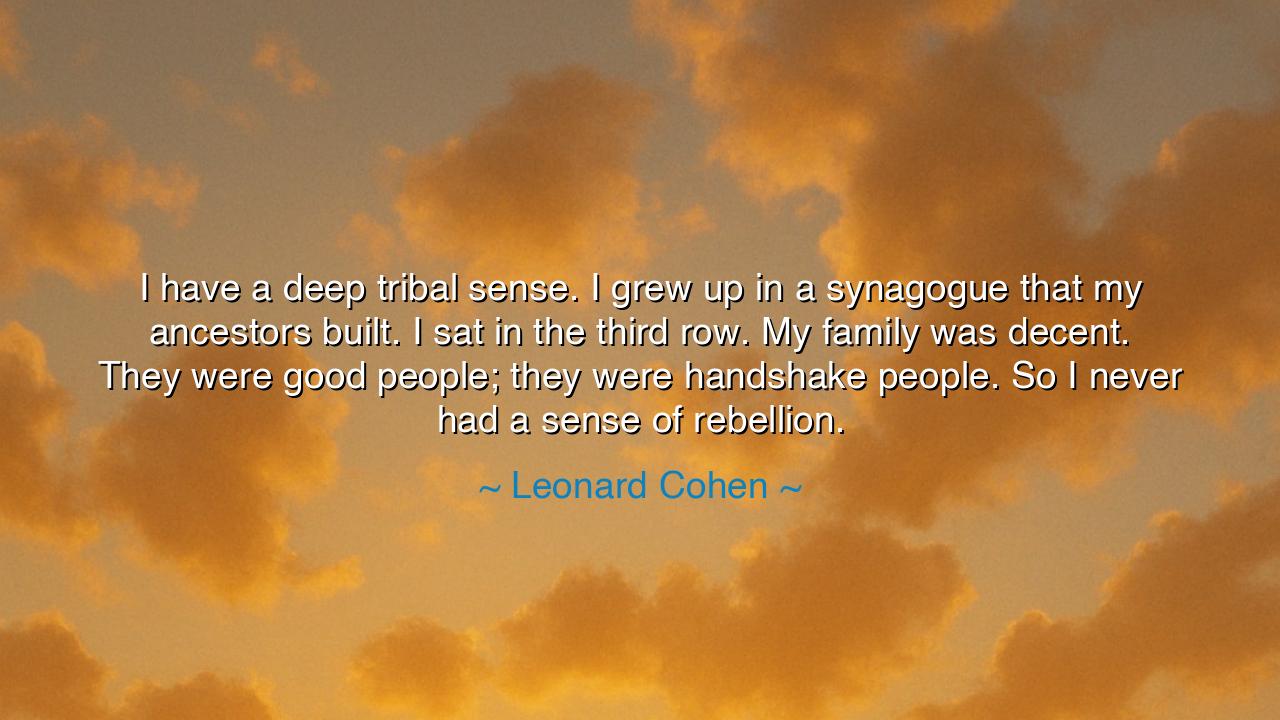
I have a deep tribal sense. I grew up in a synagogue that my
I have a deep tribal sense. I grew up in a synagogue that my ancestors built. I sat in the third row. My family was decent. They were good people; they were handshake people. So I never had a sense of rebellion.






Host: The room was quiet, the soft sound of the rain tapping against the window filling the space with a calm rhythm. Outside, the world had softened with the evening, the sky darkened and the city settled into the quiet of night. Inside, Jack sat with a book in his lap, his mind clearly drifting between the words on the page and the thoughts running through his mind. Jeeny was across from him, a soft smile on her lips as she watched him, sensing the quiet reflection in the air.
Jeeny: (breaking the silence, her voice gentle but deliberate) “You know, Leonard Cohen once said, ‘I have a deep tribal sense. I grew up in a synagogue that my ancestors built. I sat in the third row. My family was decent. They were good people; they were handshake people. So I never had a sense of rebellion.’”
(She paused, looking at Jack thoughtfully.) “What do you think he meant by that? About growing up in such a rooted, connected way, and how it shaped his sense of rebellion?”
Jack: (looking up, a small smile playing on his lips) “I think he’s talking about the foundations of his identity — the sense of connection to something larger than himself. He was surrounded by tradition, by the rituals his ancestors built, and that shaped his sense of who he was. It’s like when you grow up in a place with deep roots, there’s less of a pull to rebel, because you feel grounded, like part of a larger story.”
Jeeny: (nodding, her voice thoughtful) “Exactly. It’s not just about the family structure, but about values. His family was one that didn’t need to break away, because there was a sense of belonging and pride in the way they lived. It wasn’t about resisting or rebelling; it was about continuity and connection.”
Jack: (leaning back, his voice more reflective now) “I can see that. Sometimes, when you grow up with a strong sense of tradition, the need to rebel feels irrelevant. You’re already rooted in something that feels strong and true. There’s less of a desire to break away, because you don’t feel like you need to carve out your own path.”
Jeeny: (smiling softly) “Yes, exactly. And that sense of belonging — that everything has a place, everything is part of a larger whole — can give you a sense of peace. You don’t need to fight against the world; you just live within it, as part of the flow. There’s comfort in that stability.”
Jack: (his voice a little quieter now, almost wistful) “It’s strange, isn’t it? How some people rebel because they feel disconnected, while others feel so deeply connected to something — to family, faith, tradition — that rebellion doesn’t even cross their mind. They’re already part of something bigger than themselves.”
Jeeny: (nodding gently) “It’s about finding your place, isn’t it? When you know where you belong, when you know your roots, rebellion doesn’t feel necessary. But for others, finding their place can feel like a journey of defiance.”
Jack: (smiling softly, his voice lighter) “I think that’s why Leonard Cohen’s words resonate. He wasn’t trying to rebel or fight against anything. He was just living within what was given to him, embracing it, and making his own path from there.”
Host: The silence between them felt comfortable, filled with the understanding that the need for rebellion often comes from a place of seeking, of trying to find one's own identity when they don’t feel connected to their roots. For some, the foundation is already laid, and their path is about building upon that legacy. For others, the path might be about searching, questioning, and sometimes breaking away to find where they belong.
Jack: (softly, as if to himself) “Maybe rebellion isn’t always about breaking away. Maybe it’s about finding the parts of the world, of your family, of yourself, that resonate most deeply. And then embracing those things.”
Jeeny: (smiling, her voice gentle and understanding) “Exactly. It’s not about rejecting everything that came before you. It’s about deciding what you carry forward and what you make your own. That’s where the real growth happens.”
Host: The rain continued outside, its rhythm gentle but constant, like the steady pull of tradition and identity. Inside, Jack and Jeeny sat quietly, understanding that both roots and rebellion had their place in the story of who we become. Whether we grow from a place of strong tradition or from the desire to carve a new path, both journeys were part of the larger journey of finding ourselves.
And in that understanding, there was peace. The peace that comes from knowing where you belong — and the freedom to choose how you fit into the world.






AAdministratorAdministrator
Welcome, honored guests. Please leave a comment, we will respond soon